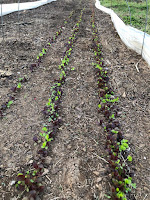Additional income from your homestead
Homesteading is about being self-sufficient, right? Creating income
from your homestead is how we get one step closer to financial freedom
and self sufficiency. Most homesteaders use their land to produce for
themselves and their families and that’s great. But let's take it that a step further
and think about the things you have around your homestead/small farm and
figure out ways to generate additional income. If you are a homesteader you
probably have developed a product, or skills specific to your area and climate.
Someone is probably willing to pay for that knowledge. Here are a couple ideas for
you to start brainstorming.
you to start brainstorming.
Market garden
Manure/compost
Micro green business
Eggs
Small scale woodworking
Market garden
Do you have a garden? I can’t imagine a homestead without one. It doesn’t
take much to start a garden. You can grow niche products in very small
areas, like leaf lettuce, salad turnips, bok choy, herbs, beets, carrots, dwarf
tomatoes, microgreens, Asian greens, mustard greens, cabbages.. the list
goes on and on. These are vegetable that don’t require large plots of land to
grow. You can grow a lot of food in a very small space. Locally owned
restaurants, friends and neighbors are looking for locally sourced food. It last
longer and usually taste better.
Manure/compost
If you have chickens or other livestock, this is should be easy. Each day when we
take care of our chickens we take a paint scraper and scrape up the manure in
the chicken coop. We put it in a 5 gallon bucket and usually within a week we fill two
take care of our chickens we take a paint scraper and scrape up the manure in
the chicken coop. We put it in a 5 gallon bucket and usually within a week we fill two
5 gallon buckets full. Think about that.. That’s 520 gallons of chicken manure alone
in a year that goes back into building soil for a garden. Manure mixed with grass
in a year that goes back into building soil for a garden. Manure mixed with grass
clippings, leaves, table scraps, coffee grounds and whatever else you can
compost makes for some very fertile soil. Sure, it takes a little time to compost down
but the wait is certainly worth it. Do you have any neighbors that garden? If
you're in an urban setting I’m sure your neighbors would love a couple
buckets of this locally sourced compost for their garden beds. Charge them for
each 5 gallon bucket.
Micro greens
complicated. Trust me, it’s not. If you can grow a garden then micros are a walk
in the park. Micro greens are nothing more than sprouting seeds in a tray. The
two most popular we grow are sunflower shoots and pea shoots. Restaurants
love them and you don’t need a lot of space to grow a good amount of these.
This past year we actually built some shelves on casters in our basement and
with some supplemental lighting we were in business. We were able to keep
about 50 trays going all winter for our restaurants. We generated a couple hundred
bucks per week growing these and selling to restaurants.
bucks per week growing these and selling to restaurants.
Eggs
If you have chickens this is the most obvious source of income from them. I will
caution you though, make sure you understand your investment in chickens and
what you are charging per dozen for eggs. Chickens are more expensive than
people think, especially if you are buying organic non GMO feed. I see folks
selling their farm fresh eggs at $2 and $3 per dozen and I question how
sustainable that is long term. We use them as a value added product with our
market garden. Chickens do a lot for our place, they eat our table scraps, bugs,
give us manure, and obviously eggs. Understand your finances when it comes
to chickens, or any venture on your homestead for that matter.
Small Scale Woodworking
We live in Middle Tennessee, so we are very blessed with eastern red cedar.
Luckily for us, their is a mill close to us where we can buy rough cut lumber.
Megan and I make tables, benches, desks and bookshelves with cedar. I would
say to start small, all you need are some basic power tools to knock together some
birdhouses. Most folks probably think… I have no carpentry skills, we didn't either.
And the first one you build will not look like what you had envisioned or sketched
out on paper. Each one you build after that will get better and better. Find some
simple birdhouse plans on the internet and give it a try. Let your neighbors know
and ask them if they’d be interested in adding some birdhouses in their yard.
 |
| Small desk we built using eastern red cedar |
Workshops
Are you skilled at something on your place? Do you have specific knowledge
about something unique on your place? If you do, then I’ll bet there's someone
out there willing to pay for that knowledge. Especially, if you can give them a hands
on demonstration in a forum where they can ask questions directly to you.
Look around your homestead and figure out ways to generate a little income.
As homesteaders, we want to be more self sufficient. I’m always looking for new
ways to generate additional income from our land without destroying it.
Have questions? Email me: jason@smithfamilyfarmtn.com
Jason Smith
Homesteader and Market Gardener
Email: jason@smithfamilyfarmtn.com
YouTube Channel: https://www.youtube.com/channel/UCH_6SzCMTTkjND
S8qU2TzEg
Website: www.smithfamilyfarmtn.com
Jason Smith
Homesteader and Market Gardener
Email: jason@smithfamilyfarmtn.com
YouTube Channel: https://www.youtube.com/channel/UCH_6SzCMTTkjND
S8qU2TzEg
Website: www.smithfamilyfarmtn.com









